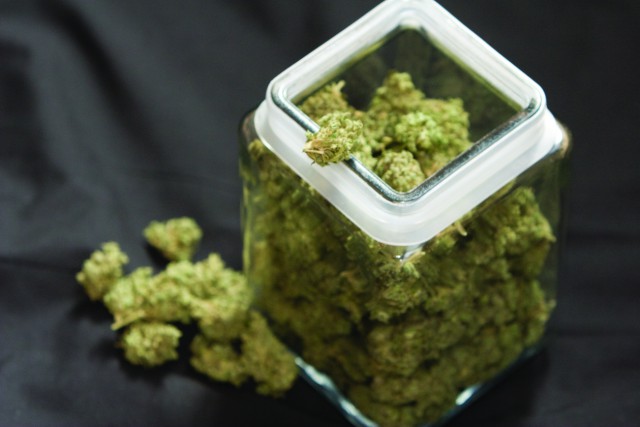
I don’t pay much attention to “trend” stories, but one that currently amuses me is the “new” inclination among country music artists to feature cannabis in their songs. Yes, it appears that some of the current generation of major country-music hitmakers are smoking a certain product, and they’re singing about it — horrors! — like it’s a positive thing.
It’s hardly a glut, and probably not a trend, but there are a few songs coming out of Nashville that include references to cannabis. Eric Church had “Smoke a Little Smoke,” and the Zac Brown Band, Randy Houser and James Johnson all make mention of cannabis in their songs. Kacey Musgraves mentions “Mary Jane” in a new song called “Follow My Arrow,” and she used to sing one that included the line “My idea of heaven is to burn one with John Prine,” a reference to Prine’s own durable “Illegal Smile.”
And of course there’s “Roll Me Up and Smoke Me When I Die,” Willie Nelson’s recent marijuana ode (and the title of his road memoir.) I’m not surprised that the generation that could be the grandchildren and great-grandchildren of Nelson and Waylon Jennings are smoking weed — it certainly reflects changing attitudes in the U.S. about cannabis use and prohibition. Country music stars promoting cannabis over alcohol can only be a good thing. I love the old country songs about alcoholism and revenge and murder as much as anybody else, but things have changed. It’s 2013.
Yet, looking around, sometimes I think cannabis is treated culturally like it’s still 1973.
I offer as evidence a recent story about a Seattle butcher who, trying to draw a little extra attention to his products, fed his bovines the husks and other waste products he cadged from medical marijuana grow facilities. The pork chops on those hogs, the butcher said, were “redder and more savory.”
The marketing ploy worked better than William von Schneidau could have possibly imagined. Google “Washington butcher marijuana” and you’ll find page after page of variations of that same story. Major media outlets fell on their swords in a swoon of tortured clichés. “High swines! Washington farmers feed pot to pigs,” bleated the New York Daily News, while MSN Money came up with “Stoned pigs fetching high pork prices.” “Marijuana gives pigs the munchies, too,” honked TIME.com.
“It’s not clear whether the pigs feel anything from the weed in their feed, or how much, if any, THC — the psychoactive substance that gets humans high — ends up in the meat,” wrote a reporter, seemingly without a hint of irony, in The Salt. (Actually, since it’s just the husks and stems, none of the THC makes it into the hogs or the pork chops. But it’s easier to ride with the cliché.)
I felt a similar twinge at the pot tax protest in Denver last month. If I squinted just right, I was back in 1970, with long-hairs waiting in line for their free joints and Grateful Dead music wafting through Civic Park. When it comes to cannabis and popular culture, we’re seemingly still stuck in the hippie era, with Richard Nixon and John Mitchell looking over our shoulders, grinning wildly. Cannabis is still one longrunning Cheech and Chong joke.
Most people who use cannabis are no different from those who don’t. They are regular citizens like anybody else, who hold jobs and raise families. They’re not sitting with a bong in one hand, shoveling Cherry Garcia by the gallon in the other. So why does the “stoner/munchie” mentality still hold sway in popular culture?
Citizens might be mellowing on marijuana, but the police don’t seem to be. Peruse the FBI crime statistics for the year 2012, and you’ll find that, in spite of the fact that Colorado and Washington have legalized possession, 21 states allow medical marijuana, and polls show increasing support for decriminalization, marijuana continues to dominate drug arrests.
Almost 750,000 Americans were arrested in 2012 for cannabis offenses, 87 percent of those for simple possession. That’s a cannabis arrest every 48 seconds, on average. Half of all drug arrests are for marijuana, which is not surprising since, despite extreme government efforts and considerable expenditures to stop it, it remains available and cheap for anyone who wants it.
The only “good” news in the report is that there were 749,825 people arrested in 2012, 1,507 fewer than in 2011. Law enforcement continues to use marijuana possession as a tool of harassment against three quarters of a million of our citizens every year.
And to what end? Dr. Sanjay Gupta recently apologized on CNN for spreading the lies the government bases its marijuana policies upon. Gupta actually did the homework, exposed several myths about the dangers of cannabis and offered salient proof of cannabis relieving symptoms of epilepsy. Has any other network followed up on his assertions or done more research into his accusations?
Nah. We get stories about pigs on dope.
Send tips, suggestions and criticisms to [email protected].
Respond: [email protected]














